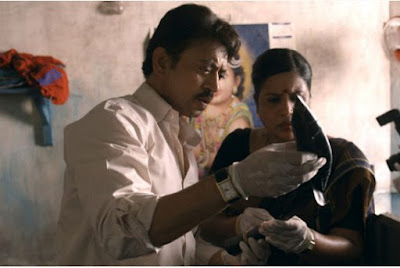 |
| It all gets a bit meta for Louis in My Scientology Movie |
What do you do if you want to
make a documentary about people who refuse to speak to you? This was the
problem facing Louis Theroux and director John Dower when they started making a
film about the Church of Scientology. Their solutions, while creating plenty of
interesting moments, unfortunately do not result in a fully satisfying look at
the organisation, or the motivations of the people drawn to it.
The first solution was to
talk to ex-Scientologists, since practicing ones wouldn't be involved. Most of
these now campaign against the Church and its controversial leader David
Miscavige. The majority of the film shows Louis getting to know Mark Rathbun,
who was Miscavige’s right hand man until 2004.
The second solution is a bit
weirder. Louis decides to recreate scenes from the history of Scientology using
actors, with Mark directing proceedings based on his recollections. The process
of casting the parts is hilarious, and the actor they find to play Miscavige is
amazing (he deserves a successful film career, but could have ruined his
chances if Scientology still holds any sway in Hollywood). However, I am not
convinced that this conceit makes any sense - they aren't really trying to make
a film about Scientology, so it's just an excuse to get Mark to talk about his
experiences, like some sort of drama therapy.
The filming sessions do get
the attention of the Church, though, and unsurprisingly they aren't happy about
it. Pretty soon Louis is being followed and filmed himself (a common tactic of
Scientology), and this leads to some very bizarre - and of course funny -
situations.
Other film makers have
successfully made films without access to their subjects, most notably Michael
Moore in Roger & Me (where he
went on a mission to talk to the head of General Motors, meeting people
affected by factory closures along the way). But Michael and Louis have very
different styles. Michael always has a message to push through. Louis's
documentaries - and I've been a fan of them since Weird Weekends back in the day - are more experiential. He disarms
his subjects through his interviews, getting to know them, slowly revealing
their inner workings, and never really taking a side. The interviews are
everything.
Unfortunately for My Scientology Movie, Mark Rathbun is
not a particularly fascinating interviewee, remaining prickly throughout. Louis
never really gets a chance to properly press him on his involvement in the
alleged abusive practices at Sea Org, Scientology's elite base. We never even
find out when he joined the Church, or how he managed to climb so high in the
hierarchy, only that he feels persecuted since leaving.
My Scientology Movie is Louis's first feature-length film, but just
isn't his best work. It doesn't get deep enough into the psyche of the
interviewees, or tell you enough about Scientology, for my liking. However, that doesn't mean it's bad and it is still definitely worth seeing. Spending a few hours with Louis is always
lovely. And Scientology is always good value because of its intense
strangeness.







